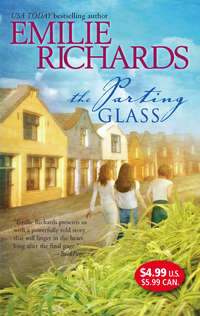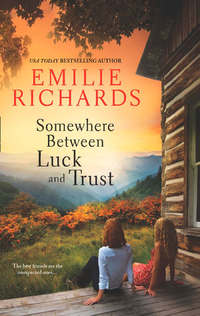
Полная версия
Fox River
Annie was a grave disappointment to her family. Vivacious and intelligent, she was also, sadly, not a pretty woman. She was as tall as a man, with broad shoulders and hands, and a lack of physical grace that arose from trying to fit herself into a world made for smaller women. Annie’s face was long, and her lovely brown eyes were shaded by unfeminine black eyebrows. I’d seen first-hand the effect she had on eligible men. Each suitor carefully weighed the humiliation of being married to a homely woman against the enticement of her name and influence. As of yet, no one had found the latter to be enticing enough.
Annie was my closest friend. Never, and I can say this without reservation, did I love her because of the benefits our friendship might hold. Certainly I was young and self-centered, but never calculating. I loved Annie for her wit, her insights, her deeply rooted loyalty. I sensed, even as a child, that Annie would never hurt me.
On the morning that Annie and her parents ended their visit to New York and came to take me and my considerable wardrobe to the train station, I said goodbye to the stuffy, cheerless home of my childhood. My mother remained in the doorway as we pulled away from the curb in an autotaxi. She didn’t wave, but she held a handkerchief to her lips, as if to block some latent protest. My last memory was of her tiny, dark-clad figure leaning against a pillar, the heavily draped windows of our house like eyelids squeezed tightly shut.
“You won’t be sorry you came,” Annie promised, taking my gloved hand in her own, as if she was afraid I already might be homesick. “We’ll have such fun, Weezy. I promise we will.”
“You’ll have to stop calling me Weezy,” I told her. “Or I won’t have any fun at all.”
Annie had a wonderful, unfettered laugh, a laugh that frightened men as much as her extraordinary height and masculine shoulders. I smiled at the sound of it and clasped her hand harder. I was absolutely certain that the best part of my life was about to unfold.
I remember, oh, I remember so very well, that ecstatic conviction that everything I’d ever dreamed of was finally within my reach.
9
An unfamiliar guard came for Christian just after breakfast. He had already eaten the requisite ounces of scrambled eggs and grits and a biscuit that was harder than Milk Bones. His second cup of coffee had been stronger than dishwater, and for once, more palatable. He hoped this was an omen for the day ahead.
“Carver…” The guard, a thin, furtive-looking man, jerked his head toward the door. “Warden wants to see you.”
Since Peter and Mel’s visit yesterday, Christian had thought of little besides the possibility of acquittal. Now, to his chagrin, his heart jumped in his chest, and not because the coffee had more than a wisp of caffeine in it.
He buttoned his work shirt as he walked half a step in front of the guard through the maze of corridors and checkpoints, making sure not to crowd the man or make him nervous. Prison life was a compromise between pride and common sense. A man gave up the parts of himself that didn’t really matter and held on to everything else he could. Long ago Christian had given up trying to prove his manhood with the guards.
Last night he’d dreamed he was mounted on a massive white stallion that lifted him over the prison walls like Pegasus floating on air currents.
The warden’s office was large and comfortable, a vivid contrast to the rest of the prison. One wall was lined with diplomas and books on psychology, law and enlightened penal systems. Christian and the guard waited in the doorway to be recognized.
At last the warden, an overweight man in his fifties, nodded to the guard. “You go on. I’ll call somebody to take him back once we’re finished here. Mr. Carver, come have a seat.”
Christian was neither fooled nor encouraged by the warden’s pleasant tone. His dealings with Warden Phil Sampsen had been mercifully brief and for the most part cordial. As long as the Pets and Prisoners program garnered positive publicity for Ludwell, Christian had little to fear. But the warden was a capricious as well as political man, filled with petty dislikes and an overblown sense of his own importance. He believed himself to be particularly insightful about the motivations of the men at Ludwell. He relished playing God with their lives and did so with alarming frequency.
“You had time for breakfast?” The warden was paging through a document on his desk and didn’t look up as Christian took a seat.
“Yes, sir.”
“Good. Good.” The warden flipped another page.
Christian knew better than to ask why he’d been summoned. He would find out when it suited the warden.
The warden scanned and flipped in silence. Christian was careful not to fidget. Finally the warden looked up, removing wire-rimmed reading glasses and setting them beside the pile of papers. He rubbed the bridge of his nose, which, like everything about him, was a little too large, a little too prominent.
“I know what’s going on with your case, Carver. I was just looking over your file.”
Christian assumed Sampsen was talking about Karl Zandoff’s confession. He wondered if the jewelry had been found. He tried not to show his impatience. “Yes, sir.”
“Looks to me like you’ve enjoyed the full benefits of the law, young man. Would you say so?”
Christian would not say so. Had he enjoyed the full benefits of the law, he wouldn’t have been brought to trial. By now he would be married to Julia Ashbourne, perhaps even be a father. Together he and Julia would be breeding and raising the best damned hunters in America.
The warden filled the silence. “Maybe you don’t think so.”
“I’ve had a good attorney. I’ve had help on the outside.”
“That would be Peter Claymore, of Claymore Park?”
Christian nodded.
“And Karl Zandoff? Have you had help from him?”
For a moment Christian didn’t know what to say. The warden’s question seemed to have come entirely out of left field. “I don’t know Zandoff, sir. I don’t know anything more about him than what I’ve read in the newspapers.”
“Well, he claims he worked in Virginia about the time Miss Sutherland was murdered. Claims he worked right down the road from her house. As I recall, you worked down the road, too, didn’t you?”
Christian phrased his answer carefully. “I grew up at Claymore Park. We get a lot of drifters in the horse business. Most jobs don’t pay that well. Men leave after a few months and move on.”
“He claims he was working construction. You had construction going on at Claymore Park about then?”
“Peter Claymore’s stables are the finest in Virginia. He’s always improving on perfection.”
“Then maybe Zandoff was one of the men working for Claymore.”
“Men come and go in construction, too. If he was there, I don’t remember him.”
“Now, I’m just wondering, son, if that’s really true.” The warden made a tent with stubby, nicotine-stained fingers. “I’m wondering if there’s something you’ve been wanting to get off your chest all these years.”
Christian didn’t think the warden was fishing for a critique of prison policy. “I’m sorry, sir. I’m not sure where you’re going with this.”
“Your family life wasn’t exactly the best, was it now?”
Christian wondered about the file on the desk in front of the warden. He kept to the basics. “My mother died when I was six. My father died when I was twelve. Peter Claymore took me in after that.”
“He’s been like a father to you? Would you say?”
“He’s been kinder than he needed to be.”
“It says here your daddy burned down Claymore’s stable.”
“That was the conclusion after the investigation.”
“He had a little drinking problem?”
“The report said my father set the stable on fire with a cigarette. They think he’d passed out.”
“Not much of a role model, son. A drinking man with so little regard for the property of others.”
Christian couldn’t let that pass. “He knew every horse in that stable. He’d raised half of them and trained most of the rest. He talked to those horses. They were never property in his mind. They meant everything to him.”
“So you’re saying he didn’t do it, is that it?”
“I’m saying he didn’t do it out of a disregard for Mr. Claymore or the horses in that stable. But he did have a problem, and in the end, I guess it got the better of him.”
“You guess?”
Christian rephrased. “In the end it got the better of him.”
“See, I’m wondering here if I’m seeing a pattern. A man denies too much, I start to worry.”
“And since I’ve said from the start that I didn’t kill Fidelity Sutherland, you’re wondering if this is all part of the same thing.”
“You got it.”
“I was twelve when my father died. He was a good man with a bad illness. The fire started in the tack room where he’d fallen asleep, and he was a chain smoker with poor judgment when he was drinking. There’s not much to dispute.”
“And Miss Sutherland?”
“The afternoon she died I was looking for her. I found her necklace on the stairs. I went up to her room—”
“You felt you had that right, huh? Just to go into her room like that?”
At the time anger had given him that right. “Fidelity and I were old friends. When I was searching for her, I thought it was odd that her necklace was just lying on the steps. I was certain she was home, so I picked up the necklace and went upstairs to find her. She was lying in a pool of blood.”
“And when the law found you, you had her necklace in one hand and the knife that killed her in the other.”
“I found the knife on the floor beside her. I picked it up. I guess I hadn’t seen enough bad movies to know better.”
“Says here it was your knife.”
“Mine was the only one unaccounted for. Mr. Claymore had half a dozen made as Christmas presents that year, with Claymore Park’s logo on the handle. They were special knives, with blades for trimming and picking hoofs, a thinning comb and a leather awl.”
“And at least one sharp cutting blade.”
Christian saw no need to answer that.
The warden looked up from the file. “You had a good lawyer, and the jury still voted to convict you. They thought you were guilty, son. So do I.”
“Most of the world agrees with you, Warden.”
“And how many of them are going to agree when Zandoff’s confession makes the headlines?”
Again Christian wondered if the jewelry had been found. “I don’t know what you mean.”
The warden rested his chin on his fingertips. “I’m talking about people not trusting you, Christian.”
Christian knew Sampsen had dropped the “Mr. Carver” on purpose. The warden had progressed to the point in the conversation when he wanted Christian to believe the two of them had overcome some hurdle, that they had become friends.
“May I speak frankly, sir?”
“You know that’s what I want.”
“Trust seems a poor second to freedom.”
“Well, I guess I can understand that.” The warden sat back in his chair. “There’s not a man at Ludwell who’d want to stay, if he didn’t have to. None except some old lifers, who’d be scared to go anywhere else. But it’s like this. Some of my men, the best of the bunch, have thought about what they did to get in here and come to terms with it. I’ve had men confess to me, like I was their priest, men who screamed and yelled they were innocent right up until they walked through these doors.”
Christian wondered what the warden had done to these so-called men. “I guess they needed to get it off their chests.”
“I respect them for it, too. A man who can confess his sins is a man on his way to cleaning up his life.”
Christian could almost hear the strains of “Rock of Ages” in the background. “If the cops find Fidelity’s jewelry buried where Zandoff says he buried it, why would anyone continue to suspect me?”
“Because you were right there, Johnny on the spot with the murder weapon. You had the girl’s blood on your hands, and you had the motive. Maybe you and Zandoff did it together.”
Christian sat back. That scenario was so far-fetched, he wondered why the warden was bothering. But he supposed it was a taste of what he would face if he was released from prison. For all he’d done and all he’d confessed, Karl Zandoff was still a mystery man. He would leave more questions than answers after his execution. One of those questions would be the circumstances behind Fidelity’s death.
The warden must have read something in his expression. “Me, I’m wondering why this Zandoff never went back and dug up the jewelry himself. Supposed to be some valuable pieces.”
“Fidelity’s jewelry was unique, very individual. It would have been impossible to sell off without detection.”
“Report says you killed her because you were furious with her. There was talk maybe you were in love with her and she wasn’t interested.”
“I didn’t kill Fidelity, and I was in love with her best friend. If I ever met Zandoff, ever even glimpsed the man, I don’t remember him.” There was nothing else to say.
“Well, I’m powerfully disappointed in you, son. I thought maybe, just maybe, we might take care of this right here and now. You see, you might get out for a while, but I’m betting you’ll be back before long. That little girl’s parents are important people. You don’t think they’re going to sit back and let you walk the streets of their town, knowing you might still be guilty. Me, I think it would be better to get it all out in the open now. Let Zandoff take credit for his share and you take credit for yours. You might get your sentence reduced. You could finish it with your head held high.”
Christian couldn’t keep the sarcasm from his voice. “Let’s see. Sentence reduced. Total freedom. Which has the most appeal?”
Warden Sampsen shook his head. “You’ve got a good record here. You’ve done good work with our guide dog program. I’m giving you the chance to do the right thing.”
“Warden, the right thing is to let me out of here.”
The warden picked up the report and thumped the edges against his desk to straighten them. Then he turned the stack and closed the folder over it. “I’ll give you some friendly advice, Mr. Carver. If some scumsucker in our legal system decides to let you out of here, don’t ever go back to Ridge’s Race. I’m already getting calls. Nobody wants you there. At best, you’re a reminder of something they’d rather forget. Go somewhere—anywhere—else. The farther away the better. But just so you know, you’ll never be able to go far enough. Because if the law finds a reason to catch back up with you, we will.”
Sampsen looked up and smiled. “We surely will.”
10
Jake passed the bread basket to Maisy. “There was some sort of commotion today over at South Land, or maybe it was Claymore Park. When I went to the hardware store, I saw half a dozen sheriff’s department cars on the dirt road that runs between them.”
The family was enjoying a late-night supper. Julia was halfway through a plate of lasagna, some portion of which had landed on her napkin. A long day had passed as she had struggled to reorient herself to the house that had once been home.
“What do you suppose that’s about?” Maisy said, from the other end of the table. “I hope nobody’s been hurt.”
“If some kind of crime was committed, it’ll be used as another argument against development,” Jake said. “If it wasn’t, somebody will point out how important it is to keep the county rural and safe.”
Development was a hot topic in western Loudoun County. The picturesque country life they all enjoyed was constantly threatened by developers who wanted to break up the area’s farms and estates and build mini-estates or, worse, town houses. There was fear that an entire way of life would vanish into suburban sprawl.
“You didn’t hear anything when you were in town?” Julia used her index finger to scoop a bite of lasagna onto her fork.
“Kay Granville thought she glimpsed men digging a line along the fence,” he said.
“That seems odd, doesn’t it? If it was a water or power line that malfunctioned, they wouldn’t send the sheriff, would they?”
“They might if everyone else was tied up and it was important enough.”
“I could call the Sutherlands,” Maisy said. “They expect me to call for odd reasons.”
Julia’s hand paused on the way to her mouth. “We’ll find out soon enough. Flo and Frank have probably already fielded half a dozen calls.”
“If something’s wrong, we should know. So we can help.”
“If something’s wrong, we’ll know soon enough,” Jake said. “Bad news travels fast.”
“How come?” Callie wiggled in the chair beside her mother and bumped Julia’s arm. “Mrs. Quinn told us about the way sound travels in science class. How does sound know if news is good or bad?”
“It’s just an expression,” Julia lowered her fork and started scooping food on it again. “It means people like to tell each other bad news.”
Callie’s silverware clattered against her plate. “I know some bad news.”
“The dinner table’s probably not the best place for that,” Julia said.
“Well, it was only bad news a long time ago. A bad man lived around here and he killed a girl.”
Everyone fell silent. Julia realized she was holding her breath. She forced herself to speak. “This really isn’t the right time to discuss that.”
“How come?”
Maisy rescued Julia. “Because mealtime is a time for good thoughts.”
“Are sheriff’s cars good thoughts?”
“I shouldn’t have brought that up,” Jake said. “My fault.”
“Oh.” Callie was silent a moment.
Julia tried to think of a change of subject as she struggled not to show her distress.
“Too bad,” Callie said. “’Cause I know why they’re digging.”
The child’s words fell into empty space. The only sound in the room was the ticking of a Garfield the cat clock over the sink. Julia could envision the cat’s tail swishing back and forth, back and forth.
“I think you’d like to tell us why, wouldn’t you?” Maisy said at last.
Julia set down her fork. “Maisy—”
“Because when the bad man killed somebody, he buried her jewelry!” Callie said triumphantly. “And now he’s told them where.”
Even the clock seemed to stop ticking.
“How do you know this?” Maisy said.
Julia was stunned that her mother could ask the question as if it hardly mattered. Maisy was a better actress than Julia had guessed.
“Tiffany told me,” Callie said.
“How does Tiffany know?” Julia felt for her water glass. Tiffany was Callie’s best friend. Her mother Samantha trained horses at Claymore Park.
“Tiff said her mommy and a friend were talking about it.”
“Well, now we know,” Jake said. He didn’t quite manage nonchalance.
“Tiff said the bad man’s already in prison.”
“Callie, I think it’s time we moved on to another subject.” Julia was almost desperate.
“But if he’s in prison, there’s nothing wrong, is there? He did something wrong, now he’s helping. That’s good news, isn’t it?”
Julia could feel tears welling, tears that would be much too hard to explain to her daughter. For nine years she had believed in Christian Carver’s innocence. Now his daughter was discussing his confession as offhandedly as if she was discussing a friend’s birthday party.
Callie lowered her voice. “But Tiffany says he’s going to die soon. Even though he’s helping. I don’t think that’s fair, do you?”
“Enough!”
“Julia…” Maisy’s warning was clear. “Callie, this is a sad story, and really not appropriate for the table. We can talk about it after dinner, okay?”
“I still don’t think it’s fair,” Callie muttered. “Those men in Florida are mean.”
“Florida?” Maisy said.
“Maisy, we can’t tell Callie not to talk about this at the dinner table, then keep the conversation going.” Jake was firm.
Julia had lost all appetite. “Callie, are you finished eating?”
“Yes,” Callie said sullenly. “I don’t like it when everybody yells at me.”
“Nobody yelled at you except me,” Julia said. “And I’m sorry. Let’s go in the other room and finish this conversation, okay? We can let Maisy and Jake eat in peace.”
“That’s not necessary,” Maisy began.
“No, Julia’s right,” Jake said. “She and Callie can talk in the living room. When we’re done, we’ll dish up pie for everybody. Your favorite,” he told Callie. “Lemon meringue.”
“Okay?” Julia said.
“I guess.” Callie’s chair scraped the floor. “But I want a big piece.”
“You know it,” Jake said.
Julia slid her chair back and gripped the table edge. She edged herself between her chair and Callie’s before she relinquished it. Then she slid her chair back in place and turned. She allowed Callie to lead her through the doorway.
In the living room, she paused to get her bearings. “The sofa’s over there?” She pointed.
“Uh-huh.”
“Let’s sit there.”
Once they were settled, Julia put her arm over her daughter’s shoulders. “I’m sorry I snapped at you.”
Callie was obviously still pouting. “I was just telling you what Tiffany told me.”
Julia didn’t know exactly what to say. “I know you were. And we started the conversation, didn’t we?”
“Uh-huh.”
“Callie, the girl who died a long time ago was my best friend. Her name was Fidelity. She was Flo and Frank Sutherland’s daughter.”
“Really?” Callie sounded more fascinated than shocked.
Julia played with her daughter’s pigtail. “That’s why it’s hard for me to hear about this.”
“Oh…How come nobody ever told me?”
“Well, it’s not something I like to talk about.”
“Why did the man kill her?”
“Nobody really knows. Until now…until now he said he didn’t kill her. I guess maybe he’ll explain.”
“You knew him?”
Julia had known Christian, yes. In all the ways one person could know another. “He was a friend of mine, too. And of Fidelity’s. It’s very, very hard to accept the fact that he murdered her.”
“Tiff said he was driftwood.”
“Driftwood?”
“Something like driftwood.” She paused. “Drifter.”
Julia was confused. “No, a drifter is somebody who moves around a lot. He lived at Claymore Park.”
Callie lowered her voice. For the first time, the severity of what had happened seemed to sink in. “Tiff said he killed a lot of people. I’m glad he didn’t kill you, Mommy.”
“He didn’t kill a lot of people, honey. I don’t know what Tiff heard, but that’s not true.”
“Tiff said they’re going to put him in a chair and kill him because he killed so many people in Florida.”
Julia had a sudden vision of chasing a fox and having it go to ground. One moment the fox was in sight, body tensed, the next it simply vanished. “Florida? Callie, what did—”
The telephone rang, and she and Callie sat in silence as Maisy answered it. Then Maisy came into the room, telephone in hand. “It’s Flo Sutherland, Julia. She needs to talk to you. It took her a while to track you here, but she says it’s important.”
Julia didn’t reach for the telephone. In the past weeks her life had changed immeasurably. She knew it was about to change again.
“Julia?”
“Take Callie in the kitchen, would you, Maisy? I think she’s ready for her pie.”
“Come on, Callie.”
Callie got up, and only then did Julia reach for the phone. She waited until Callie and her mother had gone before she brought it to her ear.
Maisy knew better than to ask Julia to listen to the next chapter of her novel that night. After Flo’s telephone call, Julia had held up well enough to put Callie to bed and get ready herself, but Maisy knew that the one thing her daughter needed most was solitude.
The house was dark, the dishes finished, and the windows closed and latched before she went to look for Jake.
She had expected to find him in their bedroom, but when she found he wasn’t, she went out the back door and made the trek to the barn. She heard him talking to Feather Foot before she even opened the door.









